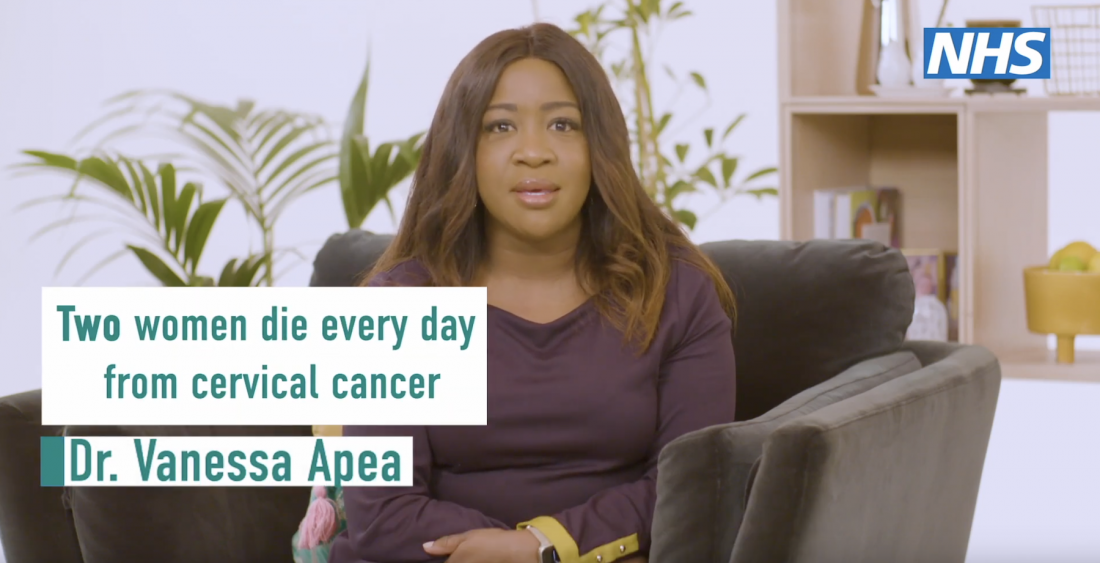Don’t let fear, embarrassment or procrastination stop you from attending your cervical cancer screening, appeals new NHS campaign film, it could save your life.

New research of 3,000 women and people with a cervix commissioned by the Department of Health and Social Care, shows that one in 10 (11%) Black women who have been invited to a screening have never attended, higher than the 7% England average. Those surveyed cited embarrassment as the most common reason for having never attended or missing an appointment (stated by 42% of respondents), followed by those who “kept putting it off” (34%) and “being worried it would be painful” (28%).
Black women talk openly about their cervical screening experiences
The new Help Us Help You – Cervical Screening Saves Lives campaign includes a new NHS film aimed at tackling some of the barriers mentioned above and information to help drive uptake. The film features Dr Vanessa Apea who is discussing cervical screening with Black women and answering some of the most common questions about the procedure.
Dr Vanessa Apea said: “It’s so important for us as Black women to talk about cervical screening so that we can address concerns and misconceptions. Cervical screening can help stop cancer before it starts. The symptoms of cervical cancer are not always obvious and there may not be any symptoms at all until it’s reached an advanced stage. Screening saves thousands of lives every year, which is why it’s important that we attend all our cervical screening appointments when we’re invited.”
Cervical cancer does not discriminate! Get a smear test
Illustrating the importance of attending a cervical cancer screening is 32-year-old Isha Webber, who received treatment after abnormal cells were detected during a routine screening. Isha said: “You can build the appointment up in your mind, but actually it’s not painful or embarrassing. The nurse put me totally at ease. At worst, it felt slightly uncomfortable. Having a cervical screening done is now a part of my self-care routine. It makes me feel more in control of my life. My advice to others is – when you get your invitation letter, book right away and don’t delay. I am so glad that I went when I did and had those abnormal cells removed. I hate to think what may have been the case if I had delayed.”

Also lending her voice to the campaign to increase take-up within the Black community is singer Rachel Kerr. “Two women die a day because of cervical cancer yet it is one of the most preventable cancers. Don’t let shame or embarrassment stop you from attending your cervical screening. Let’s take responsibility for our health and encourage our friends and family to attend their appointment when invited so more lives can be saved.”
“We’ve had the COVID-19 vaccine, have you?” NHS film urges takeup
During the film, Dr Apea highlights that the screening process is not aimed at checking for cancer, but rather checks for the presence of high-risk types of the Human Papilloma Virus (HPV), which causes nearly all cervical cancers. This is the best way to find out who is at higher risk of developing the cervical cell changes that over time could potentially lead to cervical cancer. Any cervical cell changes can be treated, preventing cervical cancer. That is why attending screening appointments is so important. Screening can help stop cervical cancer before it starts.
Top tips for women attending cervical screenings:
- If you are feeling nervous or embarrassed, talk to your nurse or doctor during the test – they can put your mind at ease and answer all your questions
- If you feel uncomfortable about being exposed from the waist down, wear a skirt, dress, or long jumper which you can keep on during the test. Don’t worry if you forget – you’ll be provided with a disposable modesty sheet to cover yourself
- The tests are usually done by a female nurse but don’t be afraid to ask for a nurse or doctor of a particular gender when booking your appointment.
- If you find the screening painful you can ask for a different size speculum or the nurse can advise you on different positions to make it more comfortable
- You can listen to music or a podcast or ask your nurse about breathing exercises – this may help you relax or distract you
- Don’t be afraid to talk about screening with your friends and family! Everyone’s had different experiences, and discussing it may help when you go for your next appointment
Dr Apea: “Please don’t hesitate to book your appointment when invited. If you have missed your last screening or are due, contact your GP practice.”
Watch the film below:
For further information about cervical cancer screening, please visit NHS.uk












